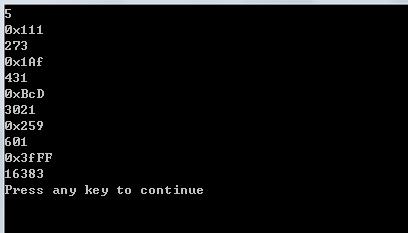C语言:输入一个十六进制字符串,将其转换成为对应的整数并输出转换结果。
Posted
tags:
篇首语:本文由小常识网(cha138.com)小编为大家整理,主要介绍了C语言:输入一个十六进制字符串,将其转换成为对应的整数并输出转换结果。相关的知识,希望对你有一定的参考价值。
输入一个十六进制字符串,将其转换成为对应的整数并输出转换结果。
输入:第一行为正整数N,表示有N组输入数据;每组输入对应一行,为一个十六进制字符串,其形式为0xXXX
输出:每组输入对应一行输出,输出转换后的十进制整数。
样例输入
5
0x111
0x1Af
0xBcD
0x259
0x3fFF
样例输出
273
431
3021
601
16383

#include "stdio.h"
#include "stdlib.h"
int main(void)
int n;
char x[9];
printf("Input n(int hex like 0x89fd)...\\n");
scanf("%d",&n);
while(n--)
scanf("%s",x);
printf("%ld\\n",strtol(x+2,NULL,16));
return 0;
参考技术A #include<stdio.h>
#include<string.h>
int main()
char c[100];
int i,leng,sum,a,N;
scanf("%d",&N);
while(N--)
sum=0;a=1;
scanf("%s",c);
leng=strlen(c);
for(i=leng-1;i>=1;i--,a=a*16)
if(c[i]>='a' && c[i]<='f') sum+=(c[i]-87)*a;
else if(c[i]>='A'&&c[i]<='F') sum+=(c[i]-55)*a;
else if(c[i]>='0'&&c[i]<='9') sum+=(c[i]-48)*a;
printf("%d\n",sum);
return 0;
来自大华科的渣渣
c语言编写一程序,以字符串形式输入十进制数,将字符串对应的十进制数转换成二进制数,将得到的结果输出。
字符串长度20位以上都可以实现。
我是初学者 刚学了数组和函数
#define N 100
void main(void)
int c=0,i,j,k,a[N];
long num;
char A,B,C,D,E,F;
printf("please input the number of you want to conversion\n"); /*输入要转换的十进制数*/
scanf("%ld",&num);
printf("\nplease input the number of scale\n"); /*输入要转换成几进制的数1-16*/
scanf("%d",&k);
for(j=0;j<N;j++)
a[j]=num%k; /*取余数赋值给数组a的成员*/
num=num/k; /*对数值num求商数,使其在下次循环时有一个新的值*/
if(num<k) /*当所要num的值小于要转换的进制数时跳出循环*/
continue;
c++; /*利用一个变量来计数,使下面输出数组进程可以有一个明确输出位数范围*/
for(i=c+1;i>=0;i--) /*倒输数组a,原理是数学的“除n取倒商法”*/
if(a[i]==10) /*十六进制中以字母ABCDEF代替9以上数字,所以在满足条件时输出字母代替10、11、12等数字*/
printf("%c",65);
else if(a[i]==11)
printf("%c",66);
else if(a[i]==12)
printf("%c",67);
else if(a[i]==13)
printf("%c",68);
else if(a[i]==14)
printf("%c",69);
else if(a[i]==15)
printf("%c",70);
else
printf("%d",a[i]); /*若没有大于9的数字,则按整形数据输出*/
getch();
参考技术A #include<stdio.h>
char intToChar(const int intValue)
switch(intValue)
case 1: return '1';
case 2: return '2';
case 3: return '3';
case 4: return '4';
case 5: return '5';
case 6: return '6';
case 7: return '7';
case 8: return '8';
case 9: return '9';
case 0: return '0';
default: return '\0';
int charToInt(const char cValue)
switch(cValue)
case '1': return 1;
case '2': return 2;
case '3': return 3;
case '4': return 4;
case '5': return 5;
case '6': return 6;
case '7': return 7;
case '8': return 8;
case '9': return 9;
case '0': return 0;
default: return 0;
/**
* 子函数用于获取字符数组除2的余数,同时数组将改变为商
* arrayLen 输入参数 字符数组的长度
* array 输入参数 字符数组(字符数组在子函数自动退化为指针)
* return 返回0或1表示除2的余数,-1表示输入的字符串已经全为0了
**/
int getRemainder(const int arrayLen, char* array)
int flag = 0; // 退位标识
int oldInt; // 除2前的数值
int newInt; // 除2后的数值
bool isZero = true;
int i; // 用来计数
// 遍历数组,从第一位除到最后一位,然后返回最后余数
for (i = 0; i < arrayLen; i++)
oldInt = charToInt(array[i]) + (flag * 10);
if (oldInt > 0)
isZero = false;
newInt = oldInt / 2;
flag = oldInt % 2;
array[i] = intToChar(newInt);
if (isZero)
return -1;
else
return flag;
int main()
const int MAX_ARRAY_SIZE = 50;
char decimalArray[MAX_ARRAY_SIZE+1];
int i; // temp variable for cycle
char c; // temp variable for getchar
printf("Please input the decimal. The char, which is not digital, means valid end.\n");
for (i = 0; (i < MAX_ARRAY_SIZE) && ((c = getchar()) >= '0') && (c <= '9'); i++)
decimalArray[i] = c;
decimalArray[i] = '\0'; // very important, Prevent cross-border
const int dArrayLen = i;
printf("The valid input is %s\n", decimalArray);
printf("------------begin translate------------\n");
int remainValue = 0; //
char binaryArray[MAX_ARRAY_SIZE * 3 + 1];
for (i = 0; remainValue != -1; i++)
remainValue = getRemainder(dArrayLen, decimalArray);
binaryArray[i] = intToChar(remainValue);
if (remainValue != -1) // 因为除2取余函数是验证输入是否全零,不加这个判断最后会多输出一行无意义信息
printf("after %d's divide by 2, the decimal array is %s\n", i + 1, decimalArray);
const int binaryLen = i;
printf("--------------end translate------------\n");
printf(" The correspond binary is: ");
for (i = binaryLen - 1; i >= 0; i--)
printf("%c", binaryArray[i]);
printf("\n");
return 0;
以上是关于C语言:输入一个十六进制字符串,将其转换成为对应的整数并输出转换结果。的主要内容,如果未能解决你的问题,请参考以下文章